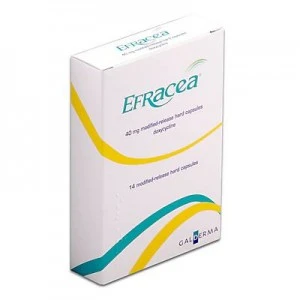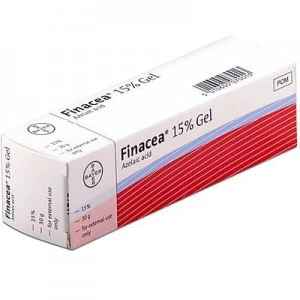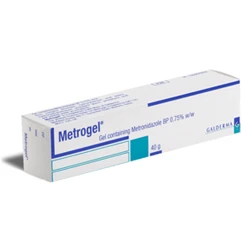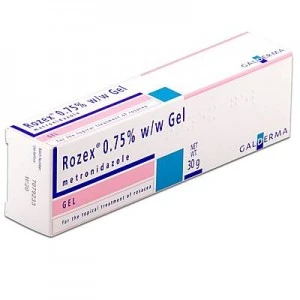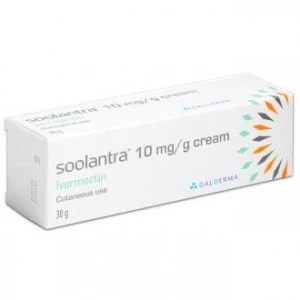Rosacea
It is estimated that 10% of the UK population is affected by the skin condition known as Rosacea. It is characterised by flushes of red, rashes, spots and inflammation across areas of the face.
Through our private and confidential free consultation service, you can now buy rosacea treatment without a prescription. One of our qualified prescribers will review your consultation, and then all approved orders will be dispatched using a 24-hour courier in plain, unbranded, discreet packaging for your confidentiality.
Efracea
- No prescription needed
- Antibiotic kills bacteria
- Sent from a registered UK pharmacy
Finacea Gel
- Effective against rosacea
- Contains azelaic acid
- Sent from a UK-registered pharmacy
Metrogel
- Effective against rosacea
- Eradicates infection
- Sent from a licensed UK pharmacy
Rozex (Cream and Gel)
- Available as cream or gel
- No prescription required
- Sent from a registered UK pharmacy
Soolantra
- No prescription required
- Reduces pimples
- Sent from Registered Pharmacy
What is Rosacea?
Rosacea (also known as Acne Rosacea) is a skin condition that affects approximately one in ten people. While it shares some characteristics of acne, there are some key differences between the two conditions.
Unlike acne, greasy skin and blackheads are not typical symptoms of Rosacea, nor do the symptoms clear after puberty. Rosacea often affects the central areas of the face, including the nose and cheeks. The condition is more prevalent in women than in men, although some symptoms, such as rhinophyma — a condition in which the sebaceous glands around the nose become inflamed — may appear more severe in men.
There are four main types of rosacea.
Erythematotelangiectatic rosacea is characterised by flushing, redness of the skin and blood vessels becoming visible.
Papulopustular rosacea causes breakouts similar to acne. The skin often appears red and swollen.
Phymatous rosacea thickens the skin, causing it to have a bumpy texture.
Ocular rosacea affects the skin around the eyes. Eyelids appear swollen and may cause a sty-like lump. Eyes can also be red and irritated.
Rosacea can also specifically affect the eyes. Known as Ocular Rosacea, this condition can cause redness and inflammation around the eyes, eyelid irritation, and the appearance of bloodshot eyes. This form of Rosacea could also be a precursor to the condition appearing across the middle third of the face, such as the cheeks and nose.
Some may mistake the blotchy redness of the skin as acne or sunburn.
Common symptoms include:
- Flushes
- Spots (papules and pustules)
- Persistent redness in the face
- Dry and rough skin
- Sensitive skin - irritation, itching, burning, stinging pains
- Swelling of the face
- Inflammation of the eyelids
While the condition can leave you feeling uncomfortable and embarrassed, there are a variety of medications which can relieve the physical and visible symptoms effectively.
What causes Rosacea?
There is considerable speculation in the medical field about what exactly causes Rosacea. While no definitive cause of the condition has been determined, several potential factors may contribute to the development of Rosacea.
Peptides, blood vessels, bacteria, mites, and genetics are all possible causes of Rosacea. It is believed that sensitivity in the skin, which causes blood vessels to dilate, may be the primary cause of the condition; however, further research is needed to confirm this.
Some people with the condition may find that certain triggers can exacerbate their symptoms, though these may not directly cause the condition in the first place. Commonly reported triggers include:
- Stress
- Exposure to sunlight
- Seasonal weather changes
- Alcohol
- Smoking
- Diet
- Strenuous exercise
- Humidity
- The menopause
- Other health conditions and medications
Though there are ways in which those with Rosacea can mitigate the risks of making their condition worse. These can include avoiding potential triggers, reducing stress levels, or using products specifically designed for sensitive skin types.
Treatments for Rosacea
Rozex
Rozex is a topical gel or cream which contains metronidazole. It is applied to the surface of the affected skin to combat bacterial infections and reduce inflammation.
Finacea
Finacea is a topical gel which contains azelaic acid. This treatment works by stopping the growth of cells within the hair follicles, which cause inflammation and irritation.
Efracea
Efracea contains doxycycline, a tetracycline-class antibiotic. Once ingested, the antibiotic targets the infection in the skin's pores, relieving inflammation and redness.
Metrogel
Metrogel is a topical gel that is applied to the areas of the skin affected by Rosacea. It contains an antibiotic that kills the infection within the follicles and reduces inflammation and the red appearance of the skin as a result.
Soolantra
When applied daily, Soolantra is an effective treatment for rosacea. The active ingredient in this medicine is ivermectin, a substance that belongs to a group of compounds called avermectins.
Using make-up to cover up the visible symptoms
Women, in particular, may benefit from using cosmetics to conceal their symptoms. When choosing makeup products, selecting those that won't aggravate your skin is important. Look out for products intended for sensitive skin.
When applying cosmetic products such as concealers, foundation and mineral powders to the face, use an antibacterial brush instead of a sponge. You may also apply the products with your fingers, but this can spread unnecessary oil from your fingers to your face.
Shaving
For men, rosacea can pose a particular obstacle to shaving. Avoiding anything that may irritate the skin and worsen rosacea symptoms is important.
Opt for an electric razor to reduce the chances of skin irritation.
Avoid using shaving creams, lotions, and aftershave products that may irritate your skin. Instead, use shaving products suitable for sensitive skin types and apply a moisturiser or balm after shaving to soothe the skin.
Resources
More about Rosacea from the NHS
The British Skin Foundation - Rosacea
How to get rid of Rosacea permanently
© 2013 - 2026 Al Muhsineen Limited. All Rights Reserved. Registered Pharmacy: 34 Halliwell Road, Bolton BL1 8RL. Registered Office: 254 First Floor, Shearbrow, Blackburn, England, BB1 8DS

